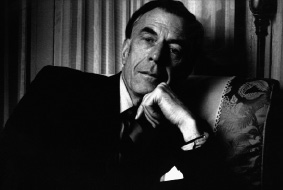John Kenneth Galbraith
John Kenneth Galbraith, economist and public intellectual, died on April 29th 2006, aged 97

ABOVE a large oak bookcase in John Kenneth Galbraith’s elegant sitting room in Cambridge, Massachusetts, a framed sampler was displayed. “Galbraith’s First Law”, read the meticulous red and blue cross-stitch: “Modesty is a vastly overrated virtue.” He thoroughly believed it. Save for his humble origins on a farm in Ontario, little about Mr Galbraith or his life was modest.
At six foot eight, he was a giant. Intellectually he was equally towering, a man who spent more than seven decades either on the stage of American public policy – as a bureaucrat in Franklin Roosevelt’s New Deal, a confidante of John Kennedy and adviser to countless other Democrats – or loudly lambasting Washington from offstage left, as a Harvard professor.
For several of those decades, Mr Galbraith – much to the chagrin of his academic colleagues – could claim to be the best-known economist in the world. His books, more than 40 of them, were spectacularly successful. All this made him an extraordinary public intellectual. But for many, particularly on America’s left, he was much more. Mr Galbraith embodied a creed (a broad scepticism of markets and unshakeable belief in a strong state to balance them) and an era, the 1960s, when that sort of liberalism reached its peak. In many eyes, and perhaps his own, Mr Galbraith was America’s Great Liberal Economist, the intellectual heir to John Maynard Keynes, whose contributions to economics are underappreciated by a profession obsessed with mathematical formulae.
He was certainly Keynes’s heir in his passion for the trenches of public policy, his recognition that economics could and should be accessible, and his way with words. A devotee of Trollope and Evelyn Waugh – “Scoop” was a favourite – Mr Galbraith strove to perfect his prose, reworking each passage at least five times. “It was usually on about the fourth day that I put in that note of spontaneity for which I am known,” he once admitted.
Bons mots, however, seemed to come naturally to him. “Economists are economical, among other things, of ideas; most make those of their graduate days last a lifetime.” “Wealth is not without its advantages, and the case to the contrary, although it has often been made, has never proved widely persuasive.” As Kennedy’s ambassador to India, Mr Galbraith preferred to write to the president direct: sending letters through the State Department, he told Kennedy, was “like fornicating through a mattress”.
Where Mr Galbraith differed from Keynes, and from other Great Economists such as Milton Friedman, was that he produced no robust economic theories. Robert Skidelsky, Keynes’s biographer, thought that he lacked “the theoretical brilliance, or perhaps merely interest”. In fact, Mr Galbraith disdained a theoretical approach to economics. This was more than a simple aversion to mathematical formulae. The greatest problem with economics, he argued, was its “wilful denial of the presence of power and political interests”. By positing an idealised world of perfect competition, economic theory assumed away the factors that drove societies.
Mr Galbraith was thus less an economist than a mixture of sociologist, political scientist and journalist. His three most influential books were snapshots of the America of their time. In “American Capitalism” (1952), giant firms were balanced by the “countervailing power” of, for instance, unions; in “The Affluent Society” (1958), massive private consumption coexisted with public decay; in “The New Industrial State” (1967), producers held all the economic power and competition was irrelevant. Timeproved especially unkind to that idea.
His faith in government, born of the searing experience of the Depression, verged sometimes on the bizarre. In 1973, for instance, he argued that America’s few-hundred biggest companies should be brought into public ownership. Yet if Mr Galbraith was often wrong, he nonetheless gave much to American public life. “The Affluent Society” not only changed the way the country viewed itself, but gave new phrases to the language: “Conventional wisdom”, “the bland leading the bland”, “private opulence and public squalor”. Amartya Sen, the Indian economist, said that reading it was like reading “Hamlet”: “You realise where [all the quotations] came from”.
Long after Mr Galbraith’s brand of big-government liberalism fell out of favour, he remained its standard-bearer. His acerbic comments on public policy were always worth reading. In private matters he was not partisan, and could count Bill Buckley, the conservative intellectual, among his closest friends. In the local bookstore in Gstaad, where they both went skiing, they would battle to get their books the best spot in the window.
A decade ago, Mr Galbraith lamented that old age brought an annoying affliction he called the “Still Syndrome”. People would constantly note that he was “still” doing things: still “interested in politics” when he showed up at a meeting, “still imbibing” when he had a drink and “still that way” when his eyes lit up on seeing a beautiful woman. The Still Syndrome lasted an immodestly long time. Its passing has left America poorer.